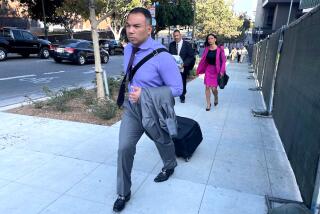Lawyer in Drug Smuggling Case Faces 20 Years
- Share via
SAN DIEGO — Interrupting the trial on its 22nd day, attorney Phillip DeMassa, a central figure in the government’s investigation of the Coronado Co. marijuana smuggling ring, has pleaded guilty to three counts of illegal currency transactions and one count of harboring a fugitive.
The plea bargain, reached late Tuesday, prohibits DeMassa from practicing in federal court until the California Bar Assn. investigates the matter. The Bar will decide whether DeMassa should be allowed to practice in state court.
“We were satisfied with the disposition. He pleaded guilty to four felony counts . . . and he agreed to resign from (practicing in) the federal bar,” U.S. Atty. Peter K. Nunez said.
Sentencing is scheduled Dec. 24. DeMassa faces a maximum sentence of 20 years in prison. The plea-bargain agreement limits DeMassa’s fine to $100,000.
The government’s investigation of DeMassa created a national furor among criminal defense attorneys in April, 1983, when federal agents conducted a three-day search of his office and home. Agents from the Internal Revenue Service, Drug Enforcement Agency and the U.S. attorney’s office justified the raid on grounds that they were looking for evidence that would link DeMassa to Coronado Co. smuggling activities.
Ninety-five cartons and more than 1,000 of DeMassa’s files were confiscated.
Last September, the U.S. 9th Circuit Court of Appeals ruled that the search was illegal because it violated DeMassa’s clients’ right to privacy.
About 60 people have been convicted since 1977 in the Coronado Co. case, and about 20 have served time in federal prison. Louis Villar, the ring’s mastermind, turned government informant and was placed on five years’ probation in exchange for his testimony against his former ring members.
DeMassa, a well-known San Diego criminal defense attorney who has defended drug suspects and members of the Hell’s Angels, among others, was indicted twice in 1984 by a federal grand jury on 16 counts of drug violations, mail fraud, currency violations and harboring a fugitive.
The currency violation convictions stem from charges that DeMassa made deposits of $10,000 or more without providing the bank with information about the source of the money.
Nunez charged that DeMassa attempted to circumvent the law by making deposits of $30,000 on June 1, 1981; $18,000 on Dec. 16, 1981, and $36,000 on May 3, 1982. The deposits were made in amounts of less than $10,000.
The charge of harboring a fugitive resulted when DeMassa harbored Robert Kent Lahodney for one night a week before Lahodney turned himself in to federal authorities. Lahodney, who was represented by DeMassa, had been indicted by a federal grand jury investigating the Coronado Co.
More to Read
Sign up for Essential California
The most important California stories and recommendations in your inbox every morning.
You may occasionally receive promotional content from the Los Angeles Times.










